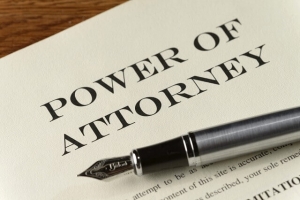
Simply stated, a Durable Power of Attorney is a legal document in which one person – the “principal” – appoints another person, called the “agent,” to act on his or her behalf. The term “durable” is used because under the terms of the legal document, the powers given to the agent continue even when the principal becomes incapacitated.
Contrast “Durable” With “Limited” Powers of Attorney
The powers granted in DPOA are generally quite broad. One cannot always anticipate the exact nature of the principals’ needs, and so flexibility is the rule. There is another type of power of attorney – the Limited Power of Attorney – in which the principal grants only very limited powers. You’ve likely executed one or more of these in the past, even if you did not realize it. For example, if you purchase an automobile at a dealership, you typically signed a limited POA at the “closing,” so that if some minor mistakes are made in the paperwork, you won’t have to come back in and re-sign a new set.
Other Characteristics of a Durable Power of Attorney
While the exact terms of a DPOA can be customized, generally the principal should bear in mind some of the following issues:
- DPOAs ordinarily take effect immediately. That does not, however, mean that the principal has lost any of his or her rights to manage the principal’s affairs. The principal can still continue to act on his or her own behalf. The primary purpose of the DPOA is not to diminish the principal’s authority; rather, it is to provide for contingencies in the future.
- The DPOA can also allow the agent to assist with medical decisions, particularly when the principal cannot make his or her own wishes known.
- Prior to incapacity, the DPOA can be revoked. In that situation, a notice must be sent in writing to the agent and any third parties (such as financial institutions) who may be relying on the DPOA.
- A financial institution can, therefore, require the agent to provide an affidavit, assuring it that the POA has not been revoked. If a financial institution rejects a power of attorney, it must do so in writing.
- The “agent” designated in the DPOA may be any competent person 18 years of age or older. Care should be exercised in the designation of the agent; the agent has broad powers. An agent need not be a family member or relative. Some financial institutions and other legal entities may also be designated as the agent in a Florida DPOA.
Need Legal Advice Regarding Gifts or Inheritances? Is a Divorce in Your Future?
Have you considered how cumbersome it would be for your family if you became ill or otherwise incapacitated? Most legal experts say a DPOA is as important as a will. At least 50 percent of Floridians have no will. Even fewer had a DPOA. The Duval/St. Johns County area law firm of Beller Law, P.L. can help you with all sorts of estate planning documents, including Durable Powers of Attorney and Wills. Delay can be burdensome and expensive. The attorney at Beller Law, P.L. have the knowledge and experience to represent your interests. Contact us online or call us at (904) 288-4414 today.
